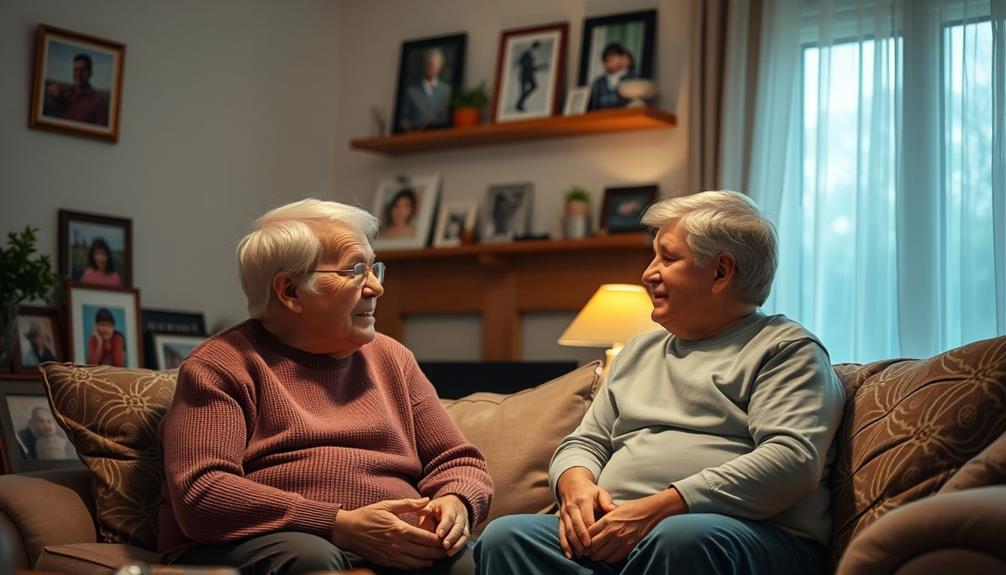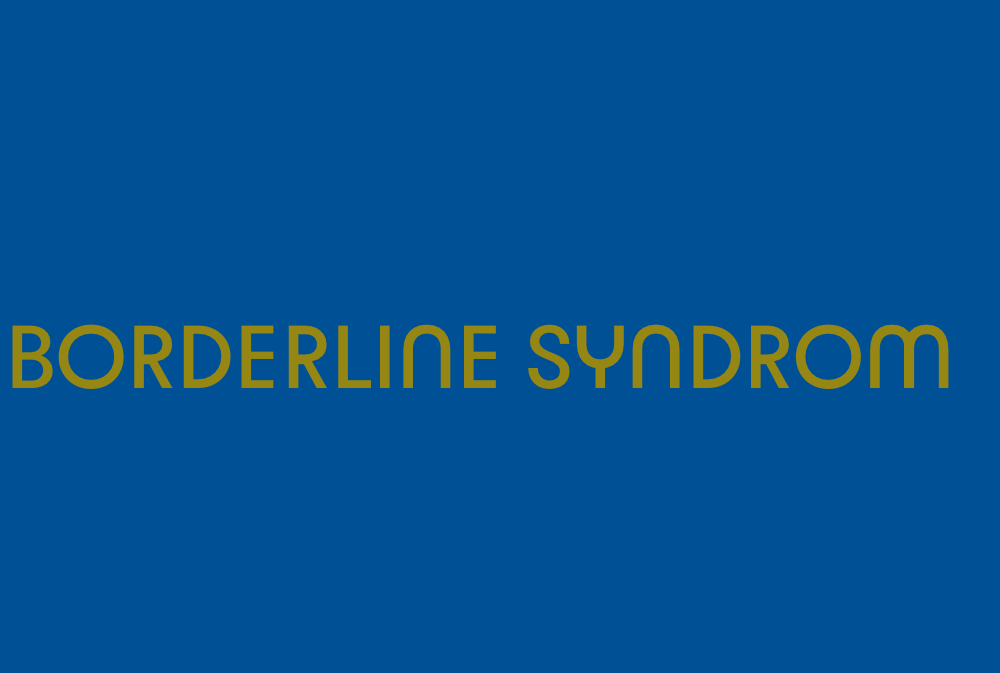Support groups are essential in your recovery journey from Borderline Personality Disorder (BPD). They provide a safe, judgment-free environment where you can share your experiences and connect with others who understand your struggles. In these groups, you gain emotional validation and learn effective coping strategies from peers who've faced similar challenges. The sense of community you develop helps combat feelings of isolation and stigma. As you interact, you'll find encouragement and empowerment, boosting your emotional well-being. Want to explore how these groups can further support your recovery? There's so much more to discover about their impact!
Key Takeaways
- Peer support groups provide a safe, judgment-free space for individuals with BPD to share experiences and foster emotional connection.
- Participants benefit from shared coping strategies, promoting personal growth and empowerment through collective experiences.
- Support sessions, co-facilitated by individuals with lived experience, enhance feelings of safety and hospitality among participants.
- A strong sense of community helps reduce isolation, enhances emotional well-being, and motivates purposeful activities beyond BPD labels.
- By normalizing struggles and fostering belonging, support groups combat stigma and improve overall mental health outcomes for individuals with BPD.
Understanding Borderline Personality Disorder
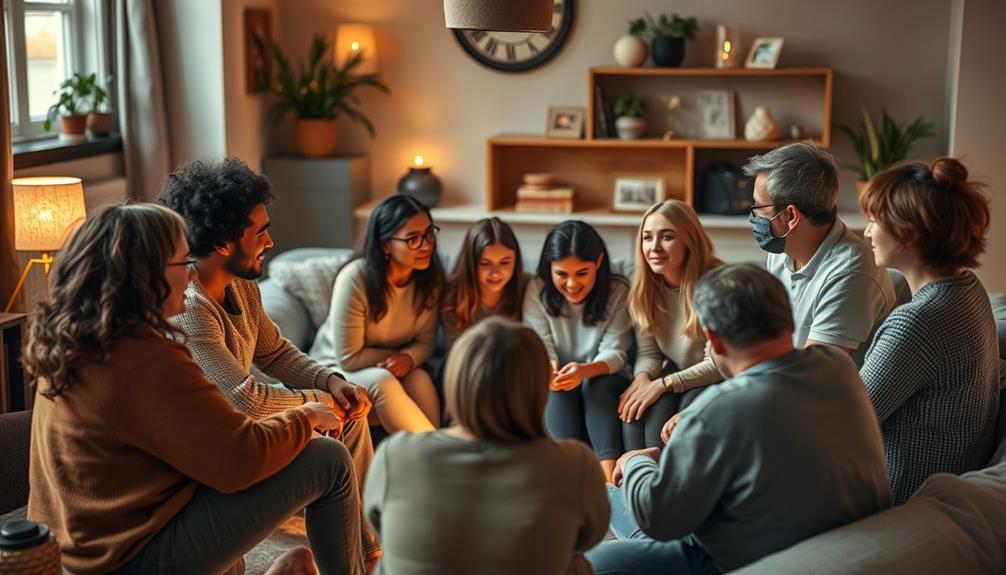
What makes Borderline Personality Disorder (BPD) so challenging to understand? This mental health condition is marked by unstable relationships, impulsive behaviors, and intense emotional responses. Individuals with BPD often struggle with a distorted self-image and may experience recurrent suicidal thoughts, which can lead to self-harming behaviors.
These symptoms create a complex scenario that can be hard for both those affected and their loved ones to navigate. The disorder is often rooted in a combination of genetic, environmental, and neurobiological factors, which further complicates understanding and treatment causes and risk factors.
The stigma surrounding BPD adds to this challenge, as many people don't fully grasp the disorder's nuances. This misunderstanding can lead to feelings of isolation for individuals with BPD, making it essential to foster environments that promote education and awareness.
Peer support services play an important role here, offering a platform for shared lived experiences. Through these services, individuals with BPD can connect with others who face similar challenges, facilitating a sense of belonging and mutual understanding.
This connection not only helps reduce stigma but also enhances treatment effectiveness, as shared coping strategies create a supportive community. Understanding BPD and its complexities is the first step toward compassion and effective support for those affected.
Importance of Peer Support

Steering through the complexities of Borderline Personality Disorder (BPD) can feel overwhelming, but peer support groups offer a beacon of hope. These groups create a safe, judgment-free space where you can freely share your experiences and feel truly understood.
Here, the curriculum is often developed by individuals with lived experience of BPD, ensuring that the focus is on empowerment and actionable recovery strategies. Engaging in these discussions can also encourage deeper self-reflection, similar to how philosophical exploration aids in understanding personal choices, as noted by philosophical insights.
Participating in peer support can greatly enhance your sense of empowerment, hope, and self-efficacy. You'll realize you're not alone in your struggles, and this connection can foster personal growth.
Many people in these groups report feeling validated about their intense emotions, which helps reduce feelings of isolation and stigma. You'll engage in open discussions about mental health, allowing you to explore your feelings in a supportive environment.
As you navigate your recovery journey, remember that the transformative impact of peer support can be profound. By connecting with others who truly understand what you're going through, you'll gain the confidence to believe in your ability to overcome the challenges of BPD and move forward on your path to healing.
Benefits of Support Groups
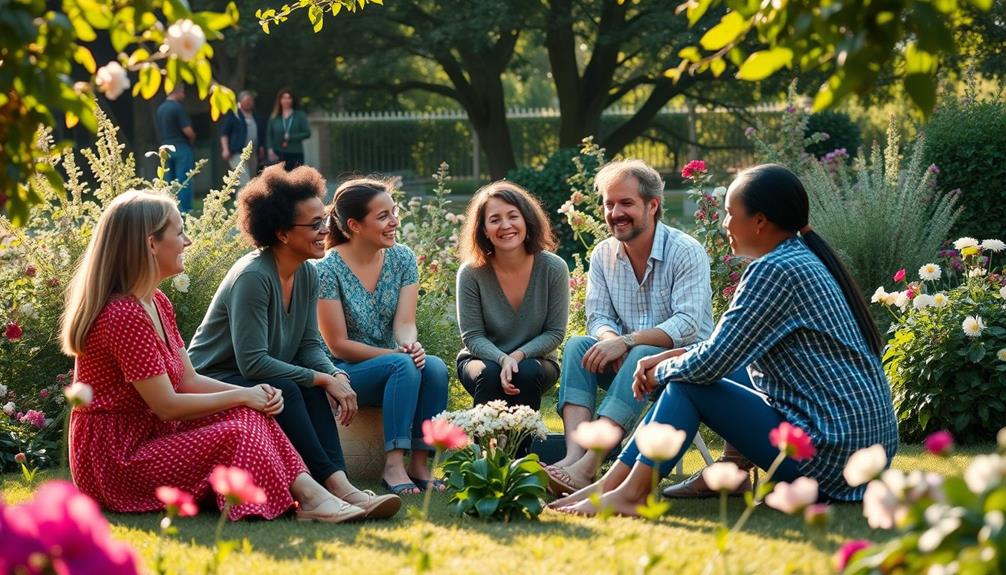
Support groups for individuals with Borderline Personality Disorder (BPD) offer numerous benefits that can greatly enhance your recovery journey. These groups create a safe, judgment-free environment where you can connect with peers who truly understand your experiences. This connection is essential for emotional validation and helps reduce feelings of isolation that often accompany BPD.
Moreover, engaging with support groups can be seen as a crucial step in addressing emotional and psychological growth, as it allows members to share insights on coping strategies that have been effective for them, linking their personal experiences to broader key domains of development in psychology.
When you share your experiences and coping strategies with others facing similar challenges, you'll likely notice significant personal growth and transformation. Engaging in discussions with like-minded individuals fosters a sense of community and belonging, which is important for emotional support.
Additionally, many participants report increased feelings of empowerment and improved self-efficacy. As you express pride in your progress and hopefulness about recovery, you cultivate a more positive outlook on your journey.
The intimate setting of support groups, limited to 65 participants, guarantees that you can be heard and understood, enhancing the overall experience.
Ultimately, being part of a support group can provide the encouragement and motivation you need to navigate the complexities of BPD while fostering meaningful relationships that contribute to your healing process.
Structure of Support Sessions

Engaging in support sessions for BPD recovery follows a structured format designed to foster connection and participation. Each session lasts 75 minutes and includes essential components like surveys, introductions, and open discussions. This structured format not only encourages peer support but also helps you feel more engaged and valued as you share your lived experience.
Furthermore, understanding the role of astrological compatibility can provide additional insights into how personality traits influence interactions in these settings.
With a limit of 65 participants and a maximum of three groups per month for each attendee, the environment remains intimate and focused. This setup allows for deeper connections and more meaningful conversations.
The sessions are co-facilitated by volunteers who also have lived experience with BPD, ensuring that you're in a relatable and empathetic space.
Safety and hospitality are at the forefront, with community guidelines promoting a judgment-free atmosphere. This encourages open sharing and vulnerability among participants.
The structured format aims to enhance solution-oriented strategies, helping you feel empowered in your recovery journey. By participating in these support groups, you'll not only connect with others maneuvering similar challenges but also gain valuable insights for your path to healing.
Participant Experiences and Feedback
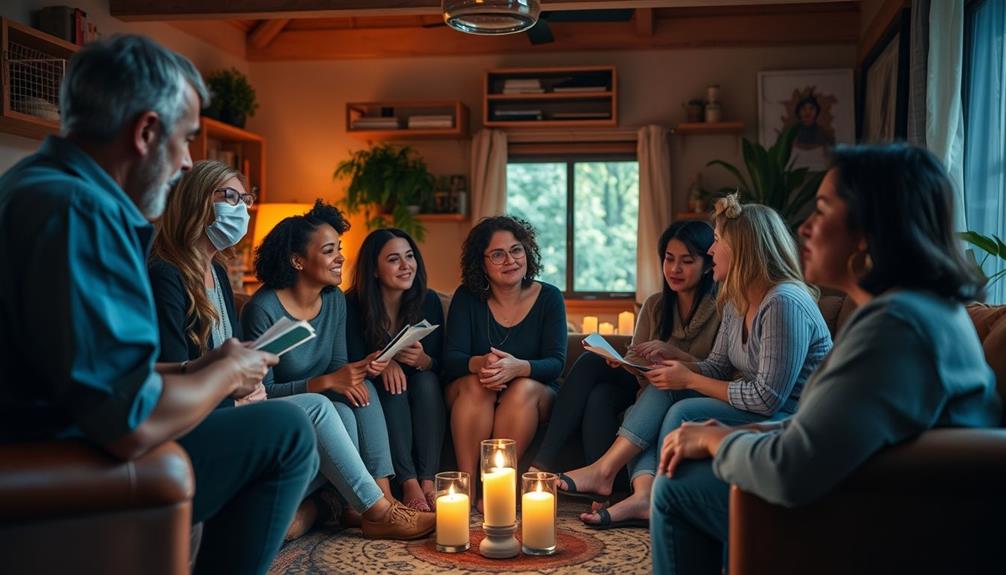
In support groups for BPD, you might find that personal transformations are common among participants.
Many share how the sense of community helps them feel less isolated and more understood in their journeys. This connection often leads to empowerment and renewed hope, making a significant impact on their recovery.
Additionally, participants often reflect on the importance of heartfelt expressions of love that foster deeper connections and understanding among group members.
Personal Transformations Reported
Transformation often emerges from the shared experiences of individuals traversing the complexities of borderline personality disorder (BPD). As you engage in peer support groups, you may witness significant personal transformations that highlight the power of recovery.
Many participants express feelings of empowerment, reporting increased self-efficacy and improved emotional regulation. These skills, learned and shared during group sessions, become essential tools in managing your emotions. Additionally, understanding the importance of community support in health recovery can greatly enhance your journey, as seen in various cold medications overview that emphasize the need for appropriate support systems.
You'll likely find that the sense of community within these groups fosters a deep connection and understanding among peers. This nurturing environment allows you to feel supported and less alone in your journey. Hearing others' stories can inspire you, instilling hope and pride in your progress.
Participants often reflect on how these transformations are directly tied to the safe, judgment-free space created by their peers. This support encourages personal growth, helping you navigate the challenges of BPD with greater resilience.
Sense of Community
Many participants in BPD support groups report a profound sense of community that considerably enhances their emotional well-being. Through shared experiences, you'll find connection and understanding that's hard to replicate elsewhere. The safe environment in these groups allows for open expression without judgment, fostering a strong bond among members.
Participants often highlight the importance of mutual support and camaraderie. As you share stories and even laughter, you alleviate feelings of isolation, creating a space where everyone feels valued. This community aspect considerably motivates individuals to engage in purposeful activities beyond their BPD labels, promoting personal growth.
Here's a quick overview of participant feedback on the sense of community in support groups:
| Participant Feedback | Impact on Recovery |
|---|---|
| Connection through sharing | Enhances emotional well-being |
| Safe, judgment-free space | Fosters open expression |
| Mutual support and humor | Alleviates feelings of isolation |
| Sense of belonging | Reinforces hope and motivation |
Overcoming Stigma and Isolation

In support groups, you can build community connections that help combat the feelings of isolation that often come with BPD.
By engaging in discussions about personal journeys, like the outrageous antics of Natalie Nunn which highlight shared experiences, sharing your lived experiences with others who understand can validate your struggles and foster a sense of belonging.
Together, you can reduce the stigma surrounding mental health by opening up conversations that encourage acceptance and support.
Building Community Connections
How can joining a support group change your experience with BPD? It can greatly reshape how you connect with others and view yourself. Support groups offer a judgment-free environment where you can share your feelings and experiences without fear of stigma. This safe space fosters a sense of belonging, allowing you to build community connections with those who understand your struggles.
Engaging in these groups can also enhance your emotional well-being by providing you with a network that understands the complexities of mental health, similar to how juice diets may lead to nutrient deficiencies if not balanced.
By participating in these groups, you'll experience:
- Reduced feelings of isolation through peer interactions
- Enhanced empowerment and self-efficacy from shared experiences
- Opportunities to learn coping strategies from others
- A supportive network that reinforces your identity beyond BPD
- Monthly meetings that cultivate mutual aid and resilience
These connections not only alleviate feelings of loneliness but also encourage you to engage in purposeful activities.
As you share your journey, you'll discover that you're not alone, and your story matters. This community can be an essential component of your BPD recovery, helping you feel understood and accepted while paving the way for positive transformations in your life.
Embracing this support can lead to profound changes in how you navigate your daily challenges.
Sharing Lived Experiences
Sharing lived experiences in support groups can be a powerful way to combat the stigma and isolation often felt by those with BPD. In these groups, you'll find a platform where you can openly share your story and hear from others who understand your struggles. This mutual sharing fosters a sense of connection that's essential for emotional healing.
When you listen to others' lived experiences, it becomes easier to recognize that you're not alone in this journey, which can greatly reduce feelings of isolation. Participants often report feeling understood and validated, which encourages more open conversations about mental health topics that are usually shrouded in stigma.
This understanding creates a judgment-free environment where you can learn effective coping strategies from peers who've faced similar challenges. The support you receive in these groups isn't just about sharing; it's about building a community that actively supports each other in recovery.
Regular engagement in support groups can enhance feelings of hope and belonging, important components for improving your mental health outcomes and promoting lasting recovery from BPD. By sharing your lived experiences, you contribute to a culture of acceptance and understanding.
Reducing Feelings of Isolation
Support groups for individuals with BPD play an essential role in reducing feelings of isolation by fostering a sense of belonging through shared experiences.
In these safe, judgment-free environments, you can connect with others who truly understand your struggles. The peer support offered in these groups is invaluable, allowing you to express your feelings and share your lived experiences without fear of invalidation.
Additionally, engaging in these groups can help you practice active listening and empathy, further enhancing your connection with others.
Here are some key benefits of participating in support groups:
- Community Connection: Building relationships with others facing similar challenges.
- Open Discussions: Sharing experiences that help normalize your feelings and reduce isolation.
- Empowerment: Gaining self-efficacy through mutual support and encouragement.
- Camaraderie: Feeling understood and supported, which enhances your recovery journey.
- Stigma Reduction: Combating the stigma surrounding BPD by celebrating shared experiences.
Regular participation in support groups not only reinforces that you're not alone but also cultivates a sense of empowerment.
Future Directions for Research
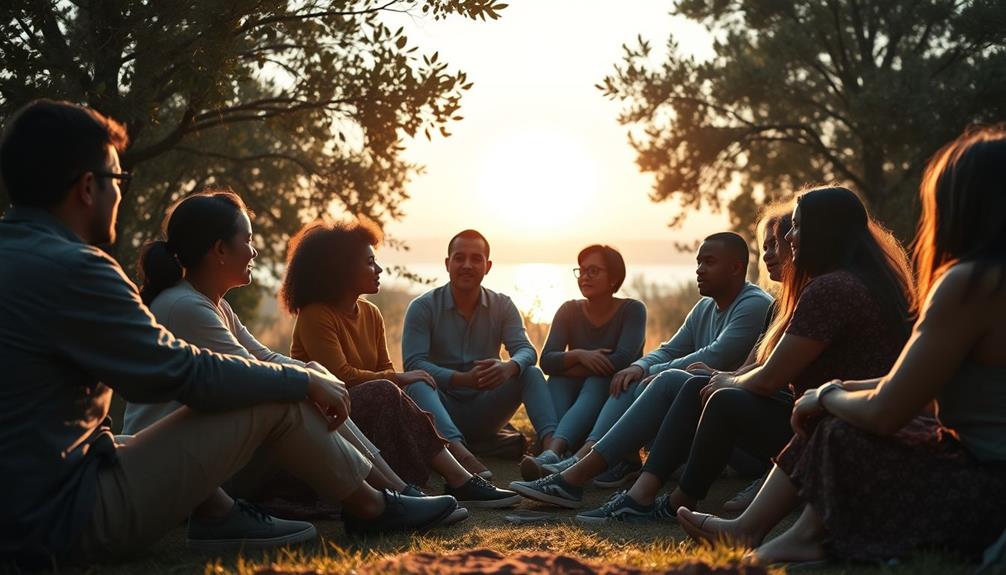
Future research on peer support models for individuals with Borderline Personality Disorder (BPD) must focus on tailoring these approaches to enhance recovery outcomes. By investigating the effectiveness of these models, you can gain insight into how they impact the recovery journey for those with BPD.
It's crucial to explore the long-term effects of participating in peer support groups, particularly regarding self-efficacy and empowerment, as these factors can greatly influence financial stability and independence in recovery. Understanding these factors will shed light on the sustainability of recovery.
Additionally, common financial terms may play a role in enhancing individuals' ability to manage their finances effectively during their healing journey.
Additionally, thorough literature addressing the unique experiences of individuals in peer-led support groups is needed. This information can help inform best practices in mental health care and guarantee that programs meet the specific needs of BPD individuals.
Future studies should also examine how integrating peer support into existing treatment plans enhances overall treatment efficacy.
Conclusion
In the journey toward healing from Borderline Personality Disorder, support groups offer a warm embrace, creating a safe haven for connection and understanding. These gatherings not only foster camaraderie but also empower you to share your experiences and grow together. As you take steps forward, remember that you're not alone; the bonds formed in these circles can light the path ahead. Embrace the power of community and let it guide you toward a brighter tomorrow.
Theresa is the visionary force behind Borderline Syndrom, steering our content towards excellence and integrity. With a keen eye for detail and a deep understanding of BPD, she ensures that our articles, stories, and resources offer our readers valuable insights, hope, and guidance. Theresa’s leadership not only shapes our editorial direction but also fosters a space where voices on BPD are heard and respected.




